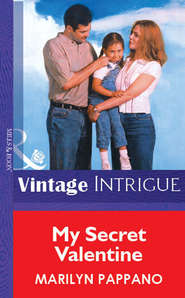По всем вопросам обращайтесь на: info@litportal.ru
(©) 2003-2025.
✖
More Than a Hero
Автор
Год написания книги
2018
Настройки чтения
Размер шрифта
Высота строк
Поля
He drove through a stone arch, then turned onto the first narrow road. There was an office to the right, but it was locked up tight. In an alcove near the door, though, he found a grave locator. He looked up the Franklins, then returned to the truck and drove slowly along the lane. Section six was at the far end of the second row of plots. It was also where the only other vehicle on the grounds was parked. A slender figure, a young woman, knelt in front of a double marker, tending the flowers planted there.
He considered driving on and returning after she was gone, but then she looked straight at him and smiled—really smiled. No one had directed a smile like that at him since he’d arrived in town.
She got to her feet and lifted one hand to stop him. He braked, then rolled down his window as she took a few steps toward him.
“You’re Jake Norris,” she said. “I was hoping to meet you. I’m—”
The angel. Silky brown curls, huge blue eyes, Cupid’s bow mouth. “Therese Franklin.” All those years ago, he’d thought she was of no consequence—too young, too girlie, too spoiled. He would have been much happier if the Franklins had had a son or even a dog.
Except that one morning when he’d found her sitting next to her dead mother. When he’d grabbed her up, held her tightly and run from the house with her, yelling for his father at the top of his lungs.
She looked pleased that he’d recognized her. According to Kylie, she’d pleaded with the senator to stop Jake from researching this case. Kylie’s lie? Or Riordan’s?
He preferred to think Riordan’s.
He parked in front of her car, then got out and joined her in the drab green grass. She was of average height and so slender that a stiff breeze could blow her away—quite possibly the most delicate creature he’d ever seen. Even her voice, light and airy, sounded as if it belonged in another world.
“I assumed I would be getting a visit from you sooner or later,” she remarked in that ethereal voice as they walked back to her parents’ graves. On the other side, another double marker bore her grandparents’ names, along with the dates of their births and his death.
Jake thought it ghoulish to have your name on a grave marker while you were still alive.
“Actually, I hadn’t decided whether I would try to interview you,” he admitted. “You were very young at the time, and I’d been warned this is a bad time for you.”
Her gaze shifted to her grandfather’s grave, and sadness dimmed her eyes. But when she looked back at him, she was smiling again, albeit faintly. “I doubt I’d be able to contribute much, if anything. But there’s a lot I’d like to know. My grandparents didn’t talk about my parents. It was too painful for them. I thought they had died in an accident until I was in high school, when I found out they’d been murdered.”
“That must have been tough.”
She shrugged.
“So you don’t object to my writing a book about this.”
Bending, she tugged a stubborn weed from the base of the monument, then straightened again. “Truthfully…you’re right. I was very young. I don’t remember my parents. I don’t feel a connection to them. They’re symbols rather than people to me. Maybe through your book I can get to know them.”
Abruptly she smiled and looked more like fifteen than twenty-five. “I’m reading your last book. I feel I know those people. That’s what I’m hoping for with this one.”
“What if you don’t like what you see?” It was always a possibility. She could find out that her mother or father had done something to cause their murders…just as he could find out that his father really had committed the murders. “They say ignorance is bliss.”
She smiled again. “Whoever says that isn’t the one being kept in the dark. I don’t think it’s too much to ask that I know about the people who brought me into this world, good or bad.”
“So you’re willing to sit down and talk with me?”
She brushed a strand of fine hair from her face. “I’d like that. My number’s—”
The squeal of tires on the highway interrupted her, and they both looked in that direction. A white police car was angled across both lanes as the driver made a clumsy U-turn.
“Derek,” Jake and Therese both said at the same time. She went on. “You know him?”
“He’s been following me, probably on the chief’s orders. I didn’t realize I’d lost him for this long.”
“He’s my boyfriend,” she said with a shy shrug. “Maybe you should leave. My number’s in the phone book. Call me?”
“I will.” Jake returned to his truck as Derek sped through the gate, then skidded into the first turn. The kid was probably enough of a hothead to confront him, unless Therese persuaded him not to.
Apparently she did. A glance back that way as Jake approached the gate showed the police car stopped in the middle of the road and Therese standing beside it, gesturing as she talked.
Jake turned west again on 66. A half mile from the cemetery, he turned north onto another paved road, followed it for a time, then reached the dirt road. He turned and stopped.
Neither house was visible from there. The road climbed straight up a hill with heavy woods on either side. At the Y, a road to the left led to the Baker house, a road to the right to the Franklins’.
Were the houses still standing? Had anyone ever lived in them again?
He would find out…but not today.
Backing onto the road, he headed back to town.
This case was becoming more difficult every time he turned around. No trial transcript, no newspaper articles, no cooperation from any of the principals besides Charley and, now, Therese, who frankly wouldn’t be much help. If her grandparents had refused to talk about her parents, then it was doubtful they’d saved anything that had to do with their deaths or the trial.
But after leaving the newspaper office empty-handed, he’d gone back to the courthouse and copied the case file before it could disappear, as well. It contained information on the warrants, a summary of each court appearance and other such data, including the name of the court reporter. He intended to track her down and see if, by chance, she still had the original of the transcript. He could find out who’d written the newspaper stories for the Journal and whether he’d kept copies. He could try to locate people who’d known Charley or the Franklins. And he could keep agitating Riordan and his cronies.
Agitated people tended to make mistakes.
It was five-thirty when he circled the courthouse. The parking spaces on the block where Riordan’s office was located were all empty but one. It held a silver Jaguar with the license tag designated for state senators. Since it had been parked there most of the day, he figured Kylie was driving Daddy’s car. He eased into the space next to it, pulled out his cell phone and punched in the office number.
He saw movement through the partially open blinds at the window in front of him an instant before she answered. “Riordan Law Office. This is Kylie.”
Shifting his gaze to the door, he saw the same name lettered in gold there. “And here I thought being a part-time senator was your father’s only job. Does he actually have any law clients?”
She was silent a moment before replying, “A few. People who have been with him from the beginning.”
“Judge Markham, Chief Roberts, Tim Jenkins…”
Somehow her silence took on an offended quality.
He rubbed his temple with one hand. “Sorry. Do you know that someone went into the library, took the microfilm containing all the newspaper stories about the Franklins’ murders and Charley’s trial and replaced it with blank film?”
“As a matter of fact, I do.”
“And that the newspaper owner just happened to send all his archives to his son in Houston just a few days ago?”
“I didn’t know when.”
“Does it bother you—”
“Yes,” she interrupted. “I admit it. Something’s wrong here. Someone’s trying to stonewall you, to dissuade you.” She gave the word dissuade a twist, as if it disgusted her. “I just can’t figure out why.”
“Because they’ve got something to hide,” he said quietly. “Because they’re covering up something that happened twenty-two years ago.”
He waited for her to argue with him, but she didn’t. She merely sighed.






